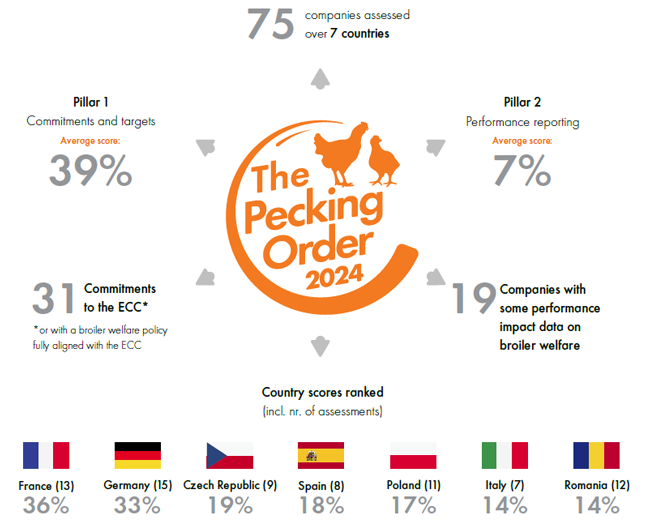No Future for Factory farming
Food systems
Factory farming is a global problem, that requires a global solution. A moratorium on factory farms is urgently needed to safeguard animals, our climate, health and the environment.

Iconic fast-food brands like Burger King, KFC, and Subway continue to lag in meeting basic welfare standards for chickens across their supply chain in Europe, as revealed in the latest European Pecking Order report. The benchmark assesses how fast-food giants measure up against the European Chicken Commitment (ECC), a set of minimum standards that can significantly improve the welfare of broiler chickens.
As sentient beings capable of experiencing pain, these animals suffer greatly within systems that prioritise cost over care.
To alleviate this massive suffering, companies in Europe should take their responsibility and commit and implement the European Chicken Commitment (ECC), a set of minimum requirements that will improve the welfare of chickens considerably and cost-efficiently. These standards are not enough to provide a good life for chickens, but they ease the worst animal welfare problems, and they are entirely feasible from a business point of view.
The findings of the 2024 Pecking Order report show uneven progress: while France and Germany are making substantial progress, other countries in Europe remain far behind.
This year’s edition of The Pecking Order is a wake-up call for companies and industry leaders to accelerate the implementation of higher chicken welfare standards. But equally, it sends a clear message to policymakers that binding legislation is essential to accelerate and standardise much needed progress in broiler welfare across Europe.

The Pecking Order criteria are based on the ECC and developed in line with the latest animal welfare science.
The brands get points for what is in their policies, how quickly they plan to improve and how they are reporting on implementation progress in relation to each of the ECC requirements. Every brand is given a grade from 6 (Very Poor) up to 1 (Leading). Please see the separate TPO 2024 Methodology document for the full methodology.
The report highlights that although many companies have made public commitments to the ECC, few have concrete roadmaps detailing how they are planning to implement the ECC criteria, or accountability structures to track progress.

Figure 1. Summarised overview of The Pecking Order 2024 results.
According to this year’s findings, not even a quarter of the 75 assessed companies provided some tangible evidence of implementing ECC-aligned welfare criteria within their supply chains. Most companies performed poorly in transparency, with over 85% lacking in performance reporting for chicken welfare standards across all markets.
We see some progress from Domino’s and Hans im Glück, as Domino’s has committed to implementing the ECC criteria in Poland this year, and Hans im Glück (Germany) has published a roadmap detailing how they are planning to achieve full implementation of the ECC criteria by 2026. Subway, on the other hand, has removed the deadline on their ECC commitment for continental Europe, except for France, and with that has taken a big step backwards.
The ECC criteria should be the bare minimum, and yet, without EU-wide legislation to enforce standards, many companies appear to lack the urgency to act. The restaurant sector leads in ECC commitments, but implementation rates remain inadequate. The lack of transparency and action highlights the need for binding regulations that hold all companies accountable to the same standards.
Food systems
Factory farming is a global problem, that requires a global solution. A moratorium on factory farms is urgently needed to safeguard animals, our climate, health and the environment.
No future for factory farming
Find out how we work with the food industry to improve farm animal welfare and keep animals in an environment where they can benefit from a life worth living
Past Campaigns
Discover annual reports ranking fast-food companies on their chicken welfare policies and what they are doing to make improvements.